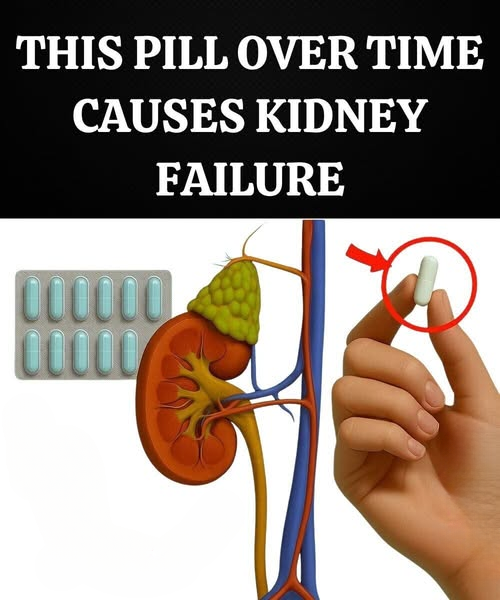Kidneys are small but vital organs, quietly filtering toxins, balancing fluids, and regulating blood pressure. Yet, kidney health often goes unnoticed until problems arise. Worldwide, over 800 million people live with chronic kidney disease, many unaware until symptoms become severe.
One major factor affecting kidney function is medication use. Even common, over-the-counter drugs can impact the kidneys if used incorrectly, for extended periods, or without medical guidance. Understanding which medications pose risks and how to use them safely can protect kidney function over the long term.
1. Proton Pump Inhibitors (PPIs) – Acid Reflux Medications
PPIs, such as omeprazole, lansoprazole, and esomeprazole, are widely used for heartburn, acid reflux, and ulcers. While generally safe short-term, long-term unsupervised use has been linked to kidney inflammation, including acute interstitial nephritis, which can progress to chronic kidney issues if unmonitored.
Safer alternatives: For occasional heartburn, H2 blockers like famotidine may be appropriate. Always consult a healthcare provider before using PPIs daily for months or years.
2. NSAIDs – Pain Relievers Like Ibuprofen and Naproxen
Nonsteroidal anti-inflammatory drugs (NSAIDs) help relieve pain, fever, and inflammation. However, prolonged or high-dose use can reduce kidney blood flow, increasing the risk of acute kidney injury, especially in older adults or those with dehydration, diabetes, or high blood pressure.
Recommendation: Avoid using NSAIDs for more than 10 consecutive days without medical supervision. Never combine multiple NSAIDs or take them while ill without consulting a doctor.
3. Aspirin, Naproxen, and Diclofenac
While useful for pain and heart health, chronic overuse of these drugs can contribute to analgesic nephropathy, slowly impairing kidney function. Warning signs include swelling in the legs or ankles, fatigue, and reduced urine output.
Tip: Patients with chronic pain should discuss safer long-term strategies with their doctor.
4. Aminoglycoside Antibiotics
Medications like gentamicin, tobramycin, and amikacin are essential for severe bacterial infections but are potentially nephrotoxic. High doses or repeated use without monitoring can damage kidney tissue, especially in older adults or those with preexisting conditions.
Safety measure: Aminoglycosides should be administered under strict medical supervision, including regular kidney function testing.
5. Lithium for Bipolar Disorder
Lithium helps stabilize mood in bipolar disorder but can affect the kidneys’ ability to concentrate urine with long-term use, potentially leading to nephrogenic diabetes insipidus.
Recommendation: Regular kidney function tests and lithium level monitoring are essential to detect changes early. Management should be coordinated between a psychiatrist and a nephrologist.
6. Diuretics – “Water Pills”
Diuretics help reduce fluid retention and control high blood pressure, but overuse can cause electrolyte imbalances, dehydration, and reduced kidney function.
Tip: Maintain adequate hydration and follow your doctor’s dosage instructions carefully. Never adjust doses without medical guidance.
7. Blood Pressure Medications (RAS Inhibitors)
ACE inhibitors (e.g., lisinopril, enalapril) and ARBs (e.g., losartan, valsartan) protect kidney function, particularly in diabetics. However, when combined with dehydration, NSAIDs, or diuretics, they may temporarily reduce kidney filtration.
Advice: Regular blood tests help ensure safe use. Do not stop these medications without consulting your doctor.
Preventive Steps for Kidney Health
Kidney damage often develops silently. Early prevention and monitoring are critical:
-
Monitor blood pressure regularly. Hypertension is a leading cause of kidney damage.
-
Stay hydrated to support kidney filtration.
-
Avoid self-medication with over-the-counter drugs.
-
Get regular lab tests (creatinine, urea, albumin) to monitor kidney function.
-
Maintain a healthy weight to reduce risk of diabetes and hypertension.
-
Control blood sugar for diabetics.
-
Quit smoking to slow kidney deterioration.
-
Limit alcohol to avoid kidney strain.
Key Takeaways
Medications save lives, but misuse can silently impact the kidneys. Always consult your healthcare provider before starting, stopping, or combining medications. Pay attention to warning signs such as swelling, fatigue, or changes in urination.
Protecting kidney health is achievable through awareness, regular checkups, and careful use of medications. Early prevention ensures that your kidneys continue to filter, balance, and sustain your health for years to come.
